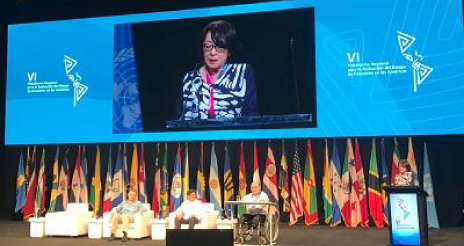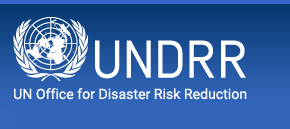- Our Mandate
- Mission and Objectives
- UNDRR in the UN
- Work Programme & Annual Reports
- Results Based System
- Work Partnerships
- Headquarters - Geneva
- SG-UN representatives for DRR
- Regional Office – The Americas and the Caribbean
- Head of the Regional Office – The Americas and the Caribbean
- What is Disaster Risk Reduction?
- What is the International Strategy?
- History of UNDRR
UNDRR head calls for more inclusion in DRR
 UNDRR head, Mami Mizutori, speaking at the opening of the 6th Regional Platform for Disaster Risk Reduction in the Americas
UNDRR head, Mami Mizutori, speaking at the opening of the 6th Regional Platform for Disaster Risk Reduction in the Americas
CARTAGENA, 20 June, 2018 – Effective disaster risk management requires an "inclusive, all-of-society approach" that reflects the views of those who suffer most from such events, the head of the UNDRR told a regional conference on disaster risk reduction.
Policy makers must heed the "voices of those who suffer disproportionately in such events. People living with disabilities, older persons, women, children and indigenous groups need to be consulted and engaged," said Mami Mizutori, Special Representative of the UN Secretary-General for Disaster Risk Reduction and head of the UN Office for Disaster Risk Reduction.
Mizutori told the opening of the three-day Vl Regional Platform for Disaster Risk Reduction in the Americas that the issue of inclusion will be a significant area of discussion at the regional platform, the first she has attended since her appointment in January.
Carlos Kaiser, Executive Director of Inclusive NGO and Representative of the Inclusive Risk Management Network for Disasters and Disability in Latin America and the Caribbean (GIRDD-LAC Network), told the opening plenary that disabled people are between two and four times more likely than others to suffer in natural disasters. "Society is not complete if it excludes many who are not considered to have the same rights," he said.
A key topic at the conference will be implementing a target of the global plan for reducing disaster losses, the Sendai Framework for Disaster Risk Reduction, calling for a substantial increase in the number of countries with national and local strategies for disaster risk reduction by the year 2020, the UNDRR chief said.
"Regional and global platforms play a pivotal role in advancing the implementation of the Sendai Framework by offering privileged spaces for assessing progress and learning from each other," she said.
The conference is taking place at a difficult time for millions of people across the region whose lives continue to be affected by catastrophic events. "In particular, my thoughts are with the people of Guatemala who are still coming to terms with the loss of possibly hundreds of lives in the Fuego volcanic eruption earlier this month."
The death toll and the fact that the lives of over one million people have been affected is a further demonstration of why the region is so committed to implementing the Sendai Framework for Disaster Risk Reduction 2015-2030, she added.
"The key to saving lives in potential disaster zones lies in the execution of national and local strategies for disaster risk reduction. It also requires strong political leadership at both the national and local level," Mizutori said.
In 2017, the Americas had one of the highest rates of population displacement in the world, largely as a result of a record-breaking Atlantic hurricane season.
"Latest research on the rise in mortality in Puerto Rico after the passage of Hurricane Maria, demonstrates the tragic long-term consequences of such events when transport links and public utilities are severely disrupted especially for those reliant on regular treatment and medical care," she said.
The economic losses and the long-term consequences of such events on sustainable development, are the reason why "we must persevere in our efforts to reduce disaster losses by switching our focus from managing disasters to managing the risks which drive these events."
"This means we have to tackle poverty, adapt to climate change, manage better the scale and quality of construction in our cities and towns, preserve protective eco-systems and strengthen institutional capacity to manage disaster risk."
UNDRR's 'Making Cities Resilient Campaign in the Americas' forms a good basis for strengthening local efforts to reduce disaster risk, Mizutori said.
Already 1,800 cities and towns across the region participate in the campaign and "this is an excellent foundation for building resilience to disasters at the local level in one of the most heavily urbanised regions in the world," she said.
Related links
The 6th Regional Platform for Disaster Risk Reduction in the Americas
Sendai Framework for Disaster Risk Reduction
Follow the UNDRR news online :
 Now we have twitter account @UNDRR Américas y el Caribe
Now we have twitter account @UNDRR Américas y el Caribe
JOIN US!
Tweets por el @UNDRR Américas y el Caribe
